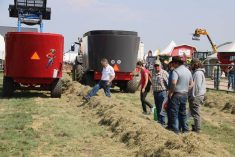Canada has a lot to learn before the country’s biofuel mandate becomes law in less than three years, says a senior Environment Canada official.
“We have excellent uptake on the part of farmers,” Terry McIntyre told a biotechnology conference in Saskatoon Sept. 28.
“They are interested. We have five or six provincial governments with varying strategies. There is a lot public enthusiasm. But there is a lot we don’t know.”
He said his department wants to minimize the environmental effects of biofuel production while making the industry sustainable.
Read Also

Supreme Court gives thumbs-up emoji case the thumbs down
Saskatchewan farmer wanted to appeal the court decision that a thumbs-up emoji served as a signature to a grain delivery contract.
McIntyre said the positive aspects of biofuel have garnered public attention in Europe.
“Any number of accolades are being afforded to biofuels,” he said.
Fuel from cropped carbohydrates has been touted as reducing carbon dioxide emissions in automobiles, creating new opportunities for farmers to profit and creating other environmental and social improvements.
“The fact is that we don’t have enough robust research data on which to base those claims,” he said.
McIntyre has spent four and a half months working with researchers, governments and industry worldwide to assemble information on biofuel production emissions from ethanol and biodiesel plants.
His department is also looking at storage, transportation and use of this new fuel.
“There are some real hurdles to overcome to adopt the biofuels and we don’t have all of the answers yet.”
Environment Canada recently published a set of guidelines that indicate air and water emissions at each point in the production of biofuel.
“If a bunch of farmers want to set up a new plant, we now have the first comprehensive set of guidelines for them to use in its design,” he said.
The department developed the guidelines by identifying what emissions are created at each stage of biofuel production. It is hoped the guidelines will be useful for companies starting new plants.
“We are also looking at the challenges of stranded fuels,” McIntyre said.
Every day 1.5 million gallons of ethanol are stranded in the United States when they can’t be moved into the fuel system because of a lack of infrastructure. McIntyre predicted that this problem will become worse as North American production expands over the next three years to meet the biofuel mandate.
“We can’t use the same systems for ethanol as we do for petroleum.”
McIntyre said petroleum companies must be convinced to create infrastructure that’s needed to deliver biofuel to the marketplace.
He said overused transportation corridors will cause delays in fuel delivery but will also complicate the shipping of ingredients plants need to produce biofuel and the byproducts and waste that those plants create.
He said Infrastructure and Transport Canada has just begun studying the changes that will be needed to accommodate biofuel production.
Water supply is another serious concern for plant sustainability.
Large amounts of water are used to remove potassium and other components from biodiesel and are needed in ethanol production for the mashing of grain or other biomass.
McIntyre said research is also needed on the total carrying capacity for biofuel plants.
















